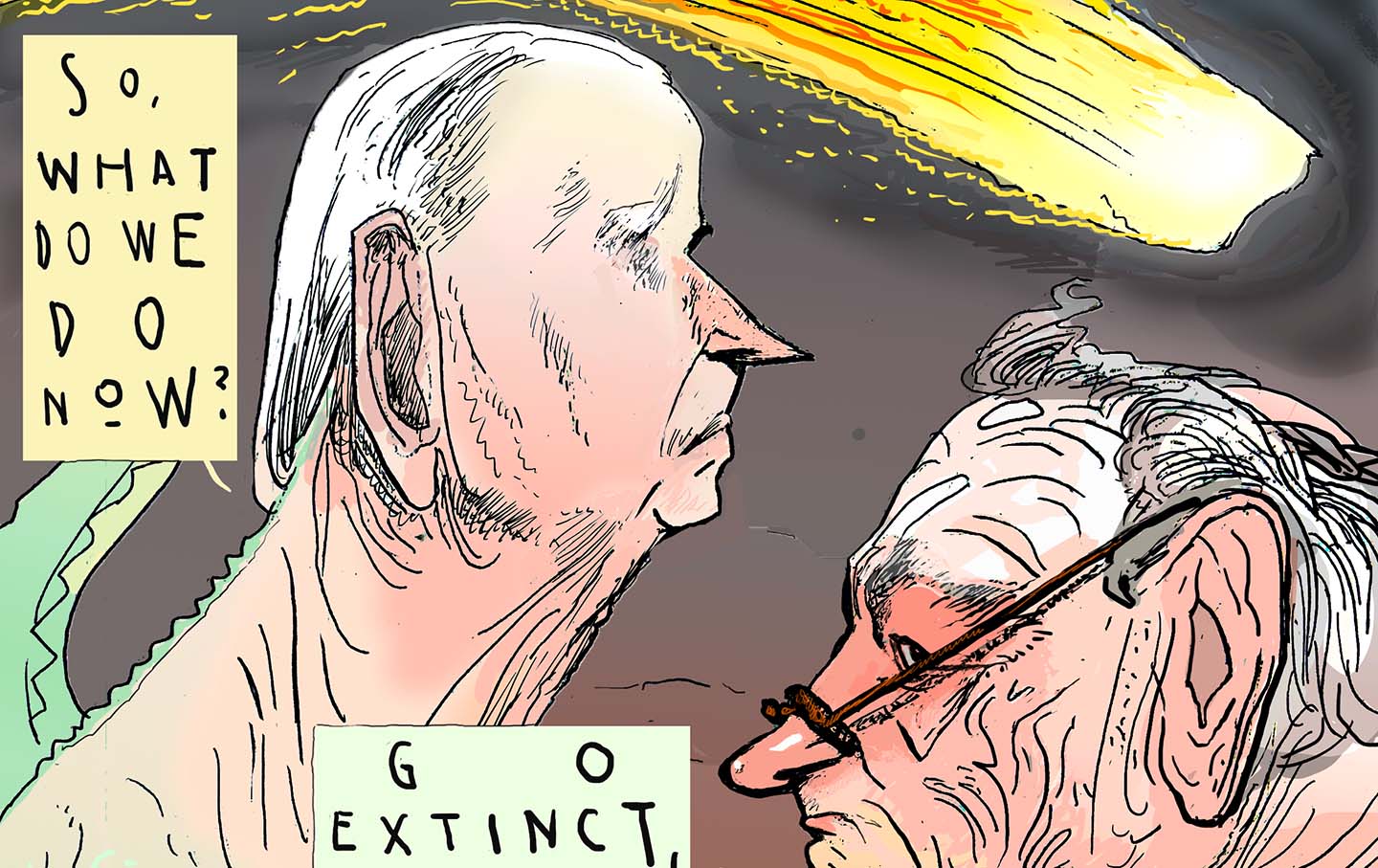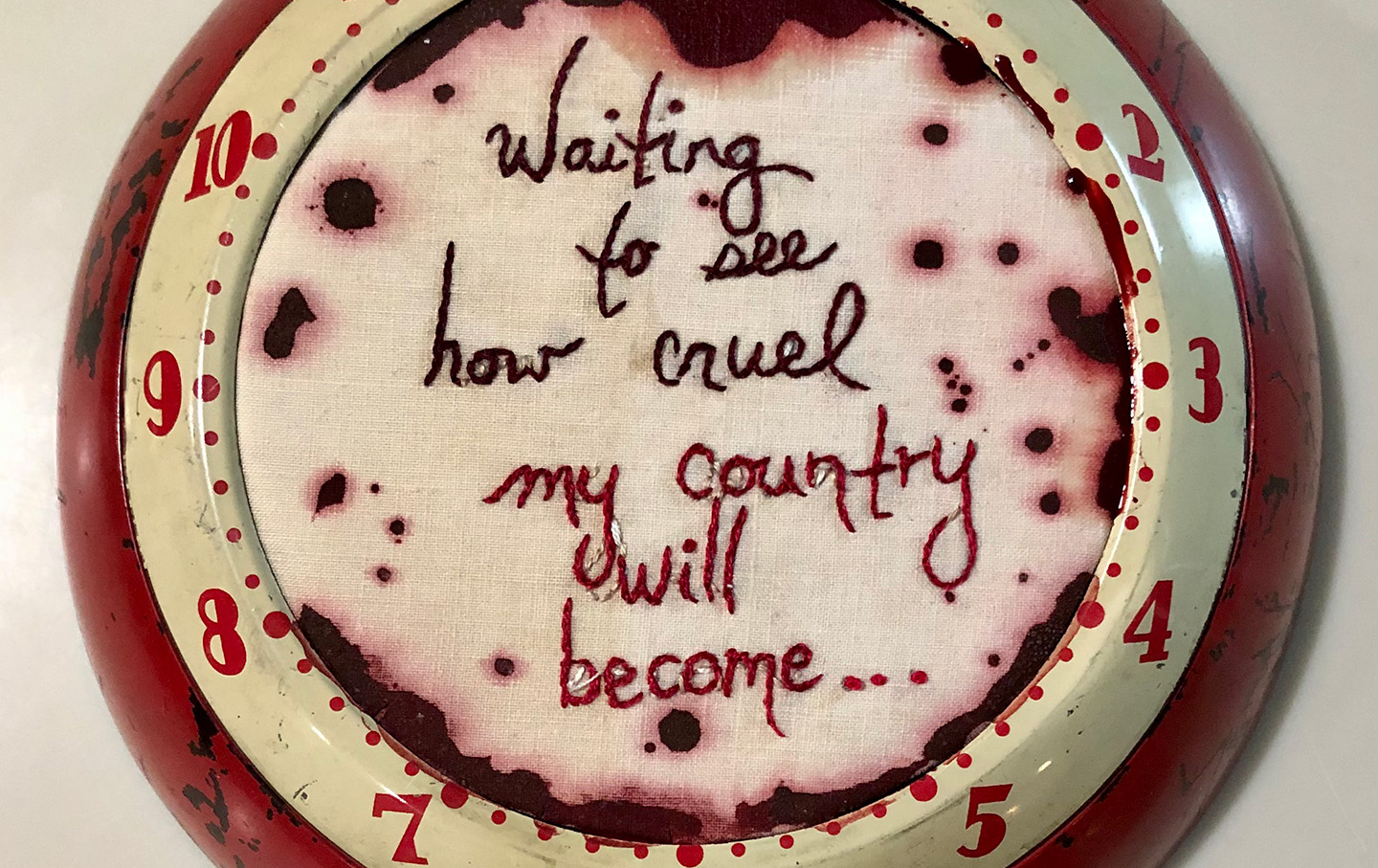Marijuana Could Be Legal in Half of US States After the 2024 Election
Florida’s Amendment 3 would legalize recreational cannabis, along with similar ballot proposals in North Dakota, South Dakota, and Nebraska.
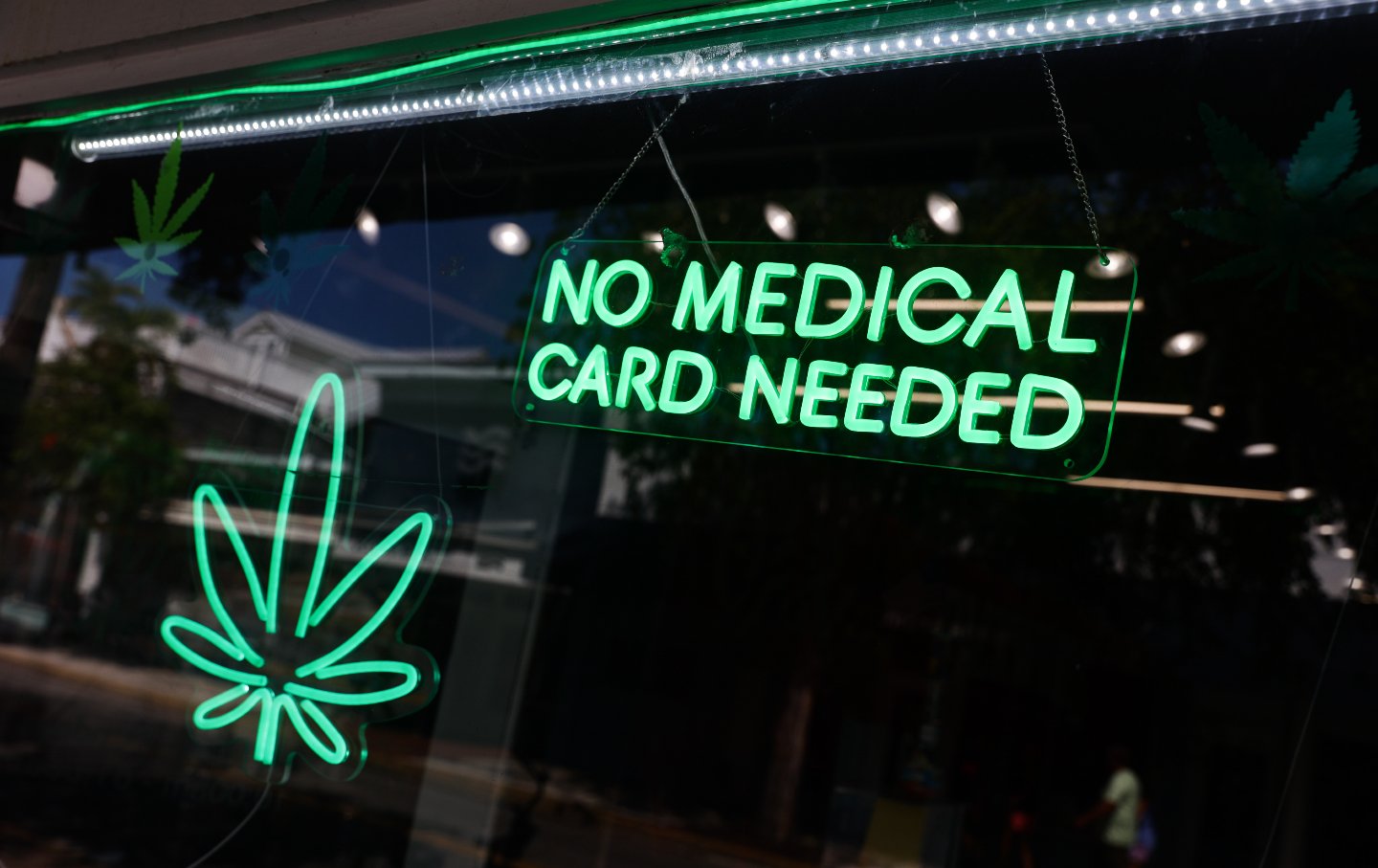
“No medical card needed” sign at a store in Key West, Florida, in May 2024.
(Jakub Porzycki / Getty)
The movement for legalizing marijuana is flying high ahead of the 2024 election.
In North Dakota, South Dakota, Nebraska, and Florida, proposals to legalize recreational cannabis are on the ballot. As it stands today, 38 states and the District of Columbia allow medical use of marijuana, while 24 have legalized it for recreation. Cannabis legalization in Florida would undoubtedly have the biggest implications, as it’s one of the two most populous states that haven’t already permitted recreational use—the other being Texas.
Ballot initiatives in the Sunshine State face an added hurdle, requiring a supermajority of voter approval. But if grassroots energy is any indication, Amendment 3 in Florida could be on its way to exceeding the 60 percent threshold. I should know, as the executive director of Students for Freedom, a Gen Z-led political committee leading campus efforts to turn out Florida college students to vote “YES,” which has visited universities across the state.
As one might imagine, persuasion isn’t as much of a challenge in this race. Generation Z is overwhelmingly in favor of legalization. Around 69 percent of voters under 50 support the amendment, according to a Florida Atlantic University poll from August. While the Dakotas and Nebraska are solidly conservative states, polling suggests that the prospects for their respective ballot measures to legalize recreational cannabis are at least a toss-up—testament to the potential of referendums to pass progressive policy in spite of a bleak partisan landscape.
Instead, the name of the game in Florida is turnout. A number of candidates are reportedly relying on ballot initiatives like Amendment 3 to boost performance up and down the ballot, a stunning realization in what many people are calling “the most important presidential election of our lifetime.”
As part of this turnout work, we registered students to vote and discussed their on-campus voting options. We brought bounce houses to campuses for students to “Get High For Amendment 3.” We set up at tailgates and handed out custom hats, stickers, shirts, and rolling papers. We dropped off thousands of Amendment 3 fliers at dorms and campus apartments. We sent tens of thousands of texts—and made an equal number of calls—to Florida college students offering voting information tailored to their campus. And after October 22, when early voting began in most counties, we sent dozens of golf carts and buses to the University of Florida and Florida State University to take students directly to the polls.
Critics of Amendment 3 are decidedly more lonely in their opposition. Perhaps the only notable voice against recreational use is Ron DeSantis, as the embattled governor’s expected allies in the Republican Party have not uniformly backed his position. Even former president Donald Trump seems to be reading the tea leaves, snubbing DeSantis by endorsing Amendment 3 in September.
Without the uniform support of his party, DeSantis instead used the state government to try to defeat Amendment 3. The taxpayer-funded Florida Department of Children and Families, for example, which is overseen by DeSantis, published notices on its website and other public channels asserting that Amendment 3 is dangerous to children.
These efforts by the DeSantis administration run afoul of the idea that the government should remain neutral and nonpartisan in regards to ballot questions, and some legal experts contend that Desantis’s heavy-handed approach may violate state and federal law.
But Florida voters will get the final say. And if public polling is to be believed, it will be a stunning rebuke of the governor’s position.
If voters pass Amendment 3 and similar measures in the other states, tens of millions of Americans would find themselves no longer at risk of criminal prosecution. The economies of these states would be boosted by a lucrative new market that would bring substantial tax revenue—which is especially beneficial in these states, as their conservative state governments’ low tax yields have come at the expense of quality public services. This election could also officially legalize cannabis recreationally in over half of the US—a significant milestone that may be the spark for legalization federally.
But should these ballot initiatives pass, there is still work to do. None of the referendums this election cycle expunge criminal records or release those sentenced to prison for marijuana possessions. Further, these initiatives grant undue advantages to cannabis monopolies and disproportionately white, affluent entrepreneurs. While decriminalization is an essential first step, equity must be the final goal.
The criminalization and over-policing of cannabis use has been one of the most infamously destructive pillars of the War on Drugs. On November 5, Americans concerned with the state of criminal justice should look past the high-profile races for a glimpse into the future of marijuana legalization nationwide.
Read the rest of StudentNation’s dispatches on the 2024 election here.
Support The Nation this Giving Tuesday
Today is #GivingTuesday, a global day of giving that typically kicks off the year-end fundraising season for organizations that depend on donor support to make ends meet and enable them to do their work—including The Nation.
To help us mobilize our community in this critical moment, an anonymous donor is matching every gift The Nation receives today, dollar-for-dollar, up to $25,000. That means that until midnight tonight, every gift will be doubled, and its impact will go twice as far.
Right now, the free press is facing an uphill battle like we’ve never faced before. The incoming administration considers independent journalists “enemies of the people.” Attacks on free speech and freedom of the press, legal and physical attacks on journalists, and the ever-increasing power and spread of misinformation campaigns all threaten not just our ability to do our work, but our readers’ ability to find news, reporting, and analysis they can trust.
If we hit our goal today, that’s $50,000 in total revenue to shore up our newsroom, power our investigative reporting and deep political analysis, and ensure that we’re ready to serve as a beacon of truth, civil resistance, and progressive power in the weeks and months to come.
From our abolitionist roots to our ongoing dedication to upholding the principles of democracy and freedom, The Nation has been speaking truth to power for 160 years. In the days ahead, our work will matter more than it ever has. To stand up against political authoritarianism, white supremacy, a court system overrun by far-right appointees, and the myriad other threats looming on the horizon, we’ll need communities that are informed, connected, fearless, and empowered with the truth.
This outcome in November is one none of us hoped to see. But for more than a century and a half, The Nation has been preparing to meet it. We’re ready for the fight ahead, and now, we need you to stand with us. Join us by making a donation to The Nation today, while every dollar goes twice as far.
Onward, in gratitude and solidarity,
Katrina vanden Heuvel
Editorial Director and Publisher, The Nation
More from The Nation
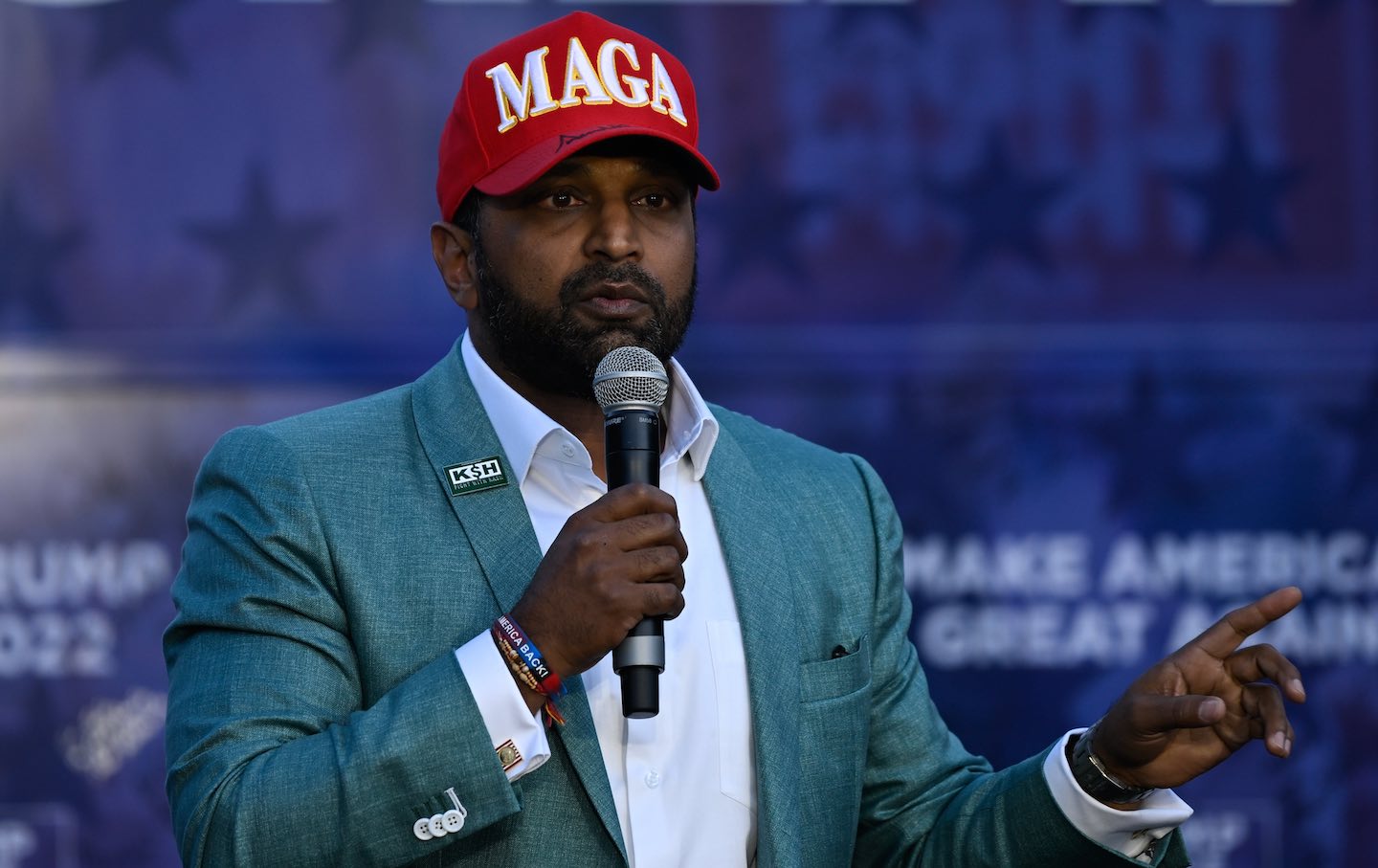
Kash Patel Is Trump’s Scariest Cabinet Appointment Yet Kash Patel Is Trump’s Scariest Cabinet Appointment Yet
The president-elect wants to put a “deep state” conspiracy theorist in charge of the actual deep state.

The Senate Must Reject Scandal-Plagued Pete Hegseth The Senate Must Reject Scandal-Plagued Pete Hegseth
And then it must keep rejecting Trump’s Cabinet picks.

Blue States Will Not Be Safe in Our Corrupt, Clownish, Authoritarian Future Blue States Will Not Be Safe in Our Corrupt, Clownish, Authoritarian Future
The Trump administration will seek vengeance against any state that tries to resist the spread of crony capitalism.
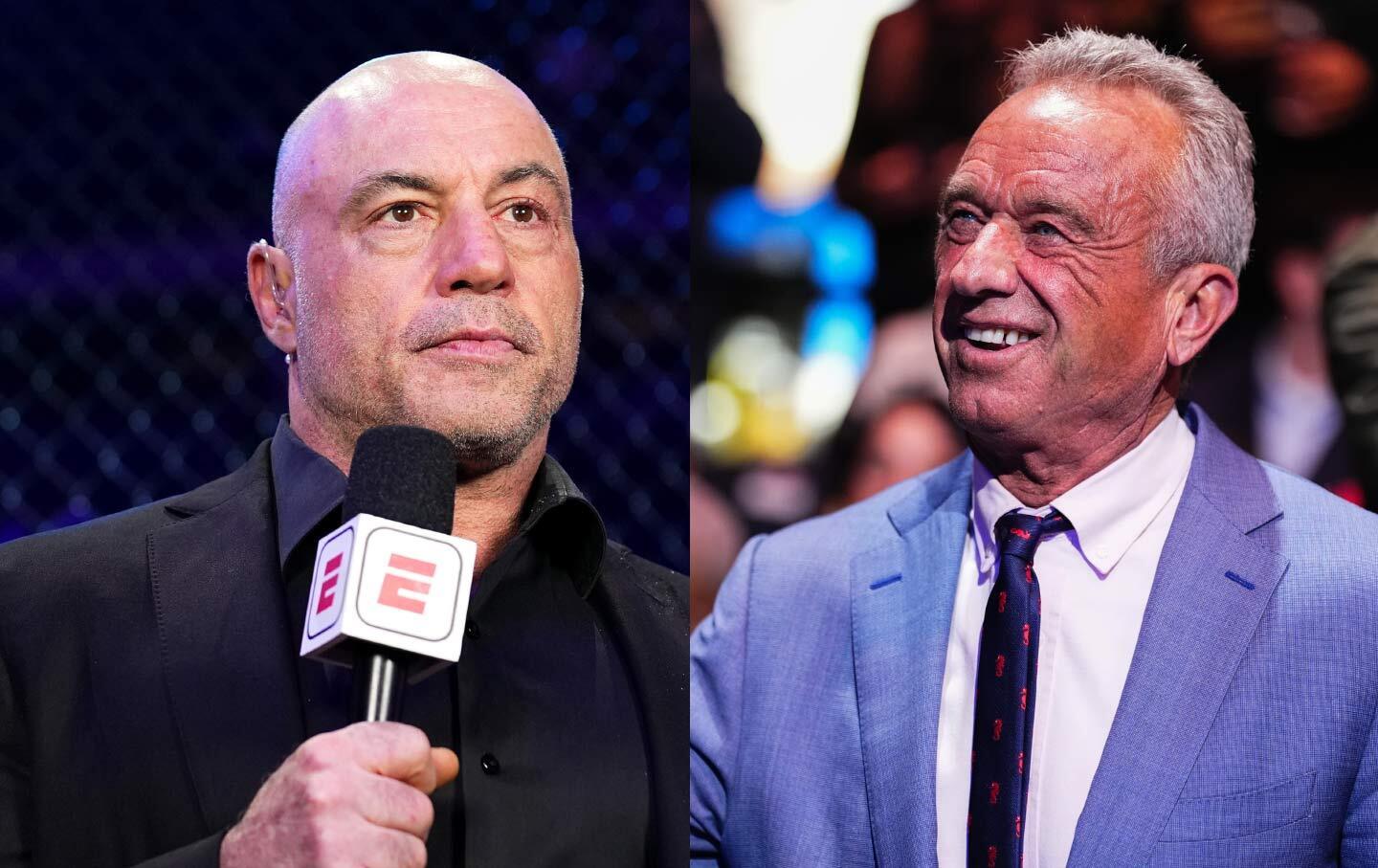
RFK Jr. Is Scary. His Online Fans Might Be Scarier. RFK Jr. Is Scary. His Online Fans Might Be Scarier.
To understand RFK Jr.'s rightward shift, we need to examine the Internet culture that fostered his growth—and which the Harris campaign ignored.

